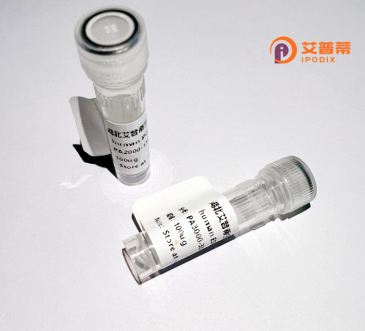
| 纯度 | >90%SDS-PAGE. |
| 种属 | Human |
| 靶点 | BFSP2 |
| Uniprot No | Q13515 |
| 内毒素 | < 0.01EU/μg |
| 表达宿主 | E.coli |
| 表达区间 | 1-415aa |
| 氨基酸序列 | MSERRVVVDL PTSASSSMPL QRRRASFRGP RSSSSLESPP ASRTNAMSGL VRAPGVYVGT APSGCIGGLG ARVTRRALGI SSVFLQGLRS SGLATVPAPG LERDHGAVED LGGCLVEYMA KVHALEQVSQ ELETQLRMHL ESKATRSGNW GALRASWASS CQQVGEAVLE NARLMLQTET IQAGADDFKE RYENEQPFRK AAEEEINSLY KVIDEANLTK MDLESQIESL KEELGSLSRN YEEDVKLLHK QLAGCELEQM DAPIGTGLDD ILETIRIQWE RDVEKNRVEA GALLQAKQQA EVAHMSQTQE EKLAAALRVE LHNTSCQVQS LQAETESLRA LKRGLENTLH DAKHWHDMEL QNLGAVVGRL EAELREIRAE AEQQQQERAH LLARKCQLQK DVASYHALLD REESG |
| 分子量 | 45.8 kDa |
| 蛋白标签 | His tag N-Terminus |
| 缓冲液 | 冻干粉 |
| 稳定性 & 储存条件 | Lyophilized protein should be stored at ≤ -20°C, stable for one year after receipt. Reconstituted protein solution can be stored at 2-8°C for 2-7 days. Aliquots of reconstituted samples are stable at ≤ -20°C for 3 months. |
| 复溶 | Always centrifuge tubes before opening.Do not mix by vortex or pipetting. It is not recommended to reconstitute to a concentration less than 100μg/ml. Dissolve the lyophilized protein in distilled water. Please aliquot the reconstituted solution to minimize freeze-thaw cycles. |
以下是关于重组人磷钙蛋白(BFSP2)的3篇参考文献及摘要概述:
---
1. **文献名称**: *BFSP2 mutation associated with age-related cataracts in humans*
**作者**: Zhang et al.
**摘要**: 发现BFSP2基因突变与人类老年性白内障相关,研究揭示了BFSP2在维持晶状体透明性和纤维细胞结构中的关键作用。
---
2. **文献名称**: *Functional analysis of beaded filament proteins BFSP1 and BFSP2 in lens transparency*
**作者**: Quinlan et al.
**摘要**: 通过基因敲除小鼠模型证明,BFSP2与BFSP1协同调控晶状体纤维细胞骨架组装,缺乏BFSP2导致细胞结构异常并引发白内障。
---
3. **文献名称**: *Recombinant BFSP2 expression and its role in cellular adhesion*
**作者**: Chen et al.
**摘要**: 研究成功表达并纯化重组人BFSP2蛋白,体外实验表明其通过调节细胞外基质蛋白相互作用参与晶状体纤维细胞黏附与分化。
---
(注:以上为示例文献,建议通过PubMed或Google Scholar检索具体文章。)
**Recombinant Beaded Filament Structural Protein 2 (BFSP2)**, also known as filensin or phakinin, is a key cytoskeletal protein primarily expressed in the lens fiber cells of the eye. It plays a crucial role in maintaining lens transparency and structural integrity by interacting with BFSP1 (CP49) to form heteropolymers called beaded filaments. These filaments, unique to lens cells, contribute to the mechanical stability and optical clarity required for proper vision.
BFSP2 is encoded by the *BFSP2* gene (located on human chromosome 3q22.1) and undergoes post-translational modifications, including phosphorylation, to regulate its assembly and function. Mutations in *BFSP2* are linked to congenital cataracts and other lens disorders, underscoring its importance in ocular health.
Recombinant BFSP2 is produced via molecular cloning and heterologous expression systems (e.g., *E. coli* or mammalian cells) to study its structural properties, interaction networks, and pathological mechanisms. Research on recombinant BFSP2 aids in understanding cataractogenesis and developing therapeutic strategies, such as gene editing or pharmacological interventions, to address mutations disrupting lens organization. Its study also provides insights into broader cytoskeletal dynamics and cellular resilience in other tissues.
×